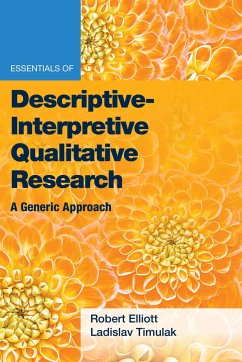
Scott D. Churchill
Broschiertes Buch
Essentials of Existential Phenomenological Research
Versandkostenfrei!
Versandfertig in 2-4 Wochen

PAYBACK Punkte
18 °P sammeln!




An existential phenomenological approach illuminates the intricate layers of human existence by embracing emotions, values, ideals, and relationships. By setting aside preconceptions, researchers capture profound insights into individualsâ personal lived realities and the inner dimensions that shape their lives.
Scott D. Churchill, PhD, began studying existential phenomenology in 9 9 at Bucknell University and continued his studies at Duquesne University, where he earned his doctorate in amp ldquo clinical phenomenological psychology amp rdquo in 984. He began his professional career at the University of Dallas in 98 , where he currently holds the position of professor, having earlier served as department chair and founding director of the master amp rsquo s programs in psychology. A fellow of the American Psychological Association (APA), he has served as editor-in-chief of The Humanistic Psychologist since 2 and is currently president of APA amp rsquo s Society for Theoretical and Philosophical Psychology. He has also served on the APA Council of Representatives and as president of the Society for Humanistic Psychology (APA Division 32), as well as editor of Methods: A Journal for Human Science, while also participating on numerous editorial boards both here and abroad. He is a founding member of the International Human Science Research Conference, the Society for Qualitative Inquiry in Psychology, and the Interdisciplinary Coalition of North American Phenomenologists. Dr. Churchill has presented papers, workshops, and invited addresses at professional conferences around the world, including Italy, Norway, Sweden, Denmark, Germany, Taiwan, Malaysia, Canada, England, India, and Australia. He has authored numerous articles and book chapters in the fields of phenomenological research methodology, empathy studies, human amp ndash bonobo communication, and second-person perspectivity. He has developed and taught well over courses in phenomenological psychology, hermeneutics, depth psychology, projective techniques, ecopsychology, primate studies, and cinema studies. Dr. Churchill was awarded the Mike Arons and E. Mark Stern Award for Outstanding Lifetime Service to the Society for Humanistic Psychology and the Charlotte and Karl B amp uuml hler Award for Outstanding and Lasting Contribution to Humanistic Psychology from APA Division 32 (Society for Humanistic Psychology) and the Steve Harrist Distinguished Service Award from Division 24 (Society for Theoretical and Philosophical Psychology). He was also named a Minnie Stevens Piper Professor for excellence in teaching. Locally, Dr. Churchill is a fellow of the Dallas Institute of Humanities and Culture and senior film and performing arts critic for the Irving Community Television Network.
Produktdetails
- Essentials of Qualitative Methods Series
- Verlag: American Psychological Association
- Seitenzahl: 110
- Erscheinungstermin: 10. August 2021
- Englisch
- Abmessung: 224mm x 147mm x 8mm
- Gewicht: 176g
- ISBN-13: 9781433835711
- ISBN-10: 1433835711
- Artikelnr.: 61995232
Herstellerkennzeichnung
Libri GmbH
Europaallee 1
36244 Bad Hersfeld
gpsr@libri.de
Für dieses Produkt wurde noch keine Bewertung abgegeben. Wir würden uns sehr freuen, wenn du die erste Bewertung schreibst!
Eine Bewertung schreiben
Eine Bewertung schreiben
Andere Kunden interessierten sich für











